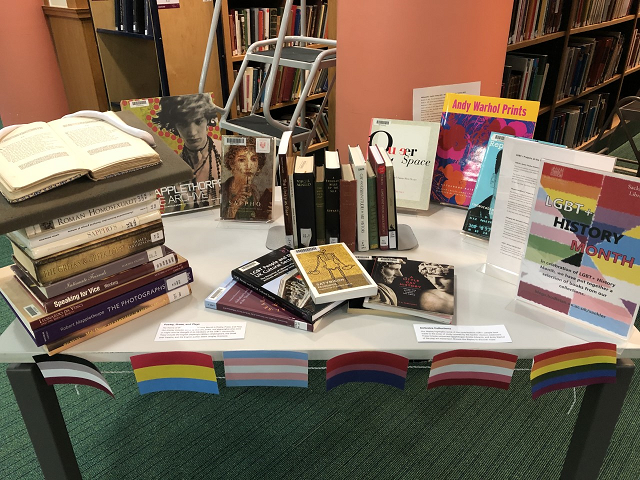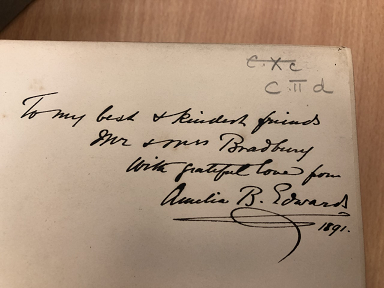February marks LGBT+ History Month in the UK, which aims to educate people about and increase visibility of the accomplishments of LGBT+ identifying people, and the contributions they have made and continue to make to society. Lesbian, gay, bisexual, transgender, queer and asexual people, as well as people of other gender, sexual and romantic minority groups, have been present in the arts, the sciences and daily life from ancient times to the modern day. The Sackler Library has chosen to celebrate the rich history and diversity of the LGBT+ community by means of a book display highlighting the contribution of LGBT+ people to the areas of study within the remit of the Sackler Library.

In terms of Classical literature, our display highlights the work of Sappho, e.g. in Rayor and Lardinois’ Sappho: a new translation of the complete works (2014). Sappho was a prolific lyric poet from the Archaic Greek era[1]. Her poetry was well-known and greatly admired through much of antiquity, and she was among the canon of nine lyric poets most highly esteemed by scholars of Hellenistic Alexandria. She is also the subject of some scholarly debate, but it is generally thought amongst modern scholars that her work portrays evidence of love and desire between women[2]. Indeed, the modern use of the word ‘lesbian’ is derived from the name of her home island of Lesbos.
We can also see the contributions of LGBT+ people in the field of Egyptology, namely through Amelia Edwards’ A Thousand Miles up the Nile, a best-selling travelogue published in 1877. Edwards, born in 1831, was an English novelist, journal-writer, and traveller, and contributed greatly to Egyptological Studies, co-founding the Egypt Exploration Fund in 1882[4]. She was also the founder of the Edwards Chair of Egyptology at University College London. Edwards died in 1892 from influenza, and was buried alongside her partner, Ellen Drew Braysher. In 2016, her grave in Bristol was designated as Grade II listed by Historic England, and is celebrated as a landmark of English LGBT+ history[5].
The cover, an illustration, and author’s signature from an 1877 edition of Edwards’ A Thousand Miles up the Nile (Sackler Library, Special Collections)
To view Special Collections materials, please enquire at the Sackler Issue Desk
Image(s) Credit: Erin McNulty
We have also highlighted the relevance of LGBT+ studies to the study of architecture by including Betsky’s Queer space: architecture and same-sex desire (1997). This work discusses how same-sex desire is creating an entirely new design process. Vincent’s LGBT people and the UK cultural sector: the response of libraries, museums, archives and heritage since 1950 (2014) also deals with LGBT+ influences in the library and heritage sector specifically.

Works on art also form a substantial part of the Sackler’s collections. Both of these disciplines benefit greatly from the contributions of the LGBT+ community. Davis’ Gay and lesbian studies in art history (1994) gives an overview of this. We have also chosen to showcase art books dealing with LGBTQ+ themes from earlier periods, such as Mills’ Seeing sodomy in the Middle Ages (2015), to the more modern, e.g. David Wojnarowicz: history keeps me awake at night and Robert Mapplethorpe: the Archive.
A library’s collections can tell the story of a community, such as the LGBT+ community, and it changes as new works are acquired. How the Sackler, as well as many other libraries across the Bodleian, tells these stories will be reviewed by the upcoming project Changing the Narrative: Championing Inclusive Collection Development. This project, led by Helen Worrell, “will champion diversifying our collection development across the Social Sciences and Humanities Libraries, with the aim of enhancing collections in areas such as LGBTIQ+ Studies, Disability Studies, Indigenous Studies, Black, Asian and Minority Ethnic (BAME) Studies and the intersections between these identities. This will enable us to think critically about the collections we currently hold so that we are aware of the gaps and the narrative these collections tell.”[5] Keep an eye out on the Sackler blog for upcoming posts regarding this project, or head to the LibGuide for more information.
Our book display also ties in to the theme of 2020’s LGBT+ History Month, launched at the Pitt Rivers Museum in Oxford: Poetry, Prose and Plays. We showcase works by all four featured authors: Dawn Langley Simmons’ Man into woman: a transsexual autobiography (1970), E. M. Forster’s Collected short stories (1947), Lorraine Hansberry’s A raisin in the sun (2011), and William Shakespeare’s Sonnets (1945 edition). We have also featured the work of ancient authors, such as Plutarch, Virgil, and Petronius, who are now thought by some scholars to have been LGBT+[6]. You can visit the LBGT+ History Month website for more information and resources.

We hope you enjoy browsing the books we have on offer on our display. However, these are only a small sample of the resources the Sackler, and the University of Oxford as a whole, has to offer for anyone interested in LGBT+ studies. For example, TORCH’s Queer Studies Network meets weekly for lectures, reading groups, seminars, workshops and events. The Bodleian Libraries are also currently trialling several informational databases, accessible through SOLO, e.g.:
Archives of Sexuality and Gender (Gale Cengage)
This resource spans the sixteenth to twentieth centuries and is the largest digital collection of historical primary source publications relating to the history and study of sex, sexuality, and gender research and gender studies research. Documentation covering disciplines such as social, political, health, and legal issues impacting LGBT communities around the world is included, as well as rare and unique books on sex and sexuality.
LGBT Magazine Archive (Proquest LLC)
Includes the archives of 26 leading but previously hard-to-find magazines, including many of the longest-running, most influential publications of this genre. For example, the complete backfile of the US publication, The Advocate, one of the very few LGBT titles to pre-date the 1969 Stonewall riots, is made available digitally for the first time. Other titles include the UK’s Gay News and its successor publication Gay Times.
LGBT Life Full Text (EBSCO)
Provides scholarly and popular LGBT+ publications in full text, plus historically important primary sources, including monographs, magazines and newspapers. It also includes a specialised LGBT+ thesaurus containing thousands of terms, 140+ full-text journals, approaching 160 full-text books and reference materials, 260+ abstracted and indexed journals and more than 350+ abstracted and indexed books and reference works.
Also, don’t miss other LGBT+ projects at the University of Oxford! For example, the Pitt Rivers Museum’s project, Beyond the Binary, due to launch this month, will work with local, national and international partners to explore the global diversity of sexual and gender identities. The project will challenge historical interpretations of the museum’s collections so that all visitors can understand humanity better. It will also include a community-focused acquisition programme for LGBT+ cultural and historical artefacts. Objects will be collected from British communities and across the globe that highlight traditions of gender non-conformity, bringing British LGBT+ heritage into conversation with global LGBT+ material culture.
We hope that you will join us in celebration of LGBT+ History Month, and that you have a fantastic February!
Erin McNulty,
Graduate Library Trainee
References
[1] Campbell, D. A. (ed.) (1982). Greek Lyric 1: Sappho and Alcaeus (Loeb Classical Library No. 142). Harvard University Press, Cambridge, Mass
[2] Rayor, Diane; Lardinois, André (2014). Sappho: A New Translation of the Complete Works. Cambridge: Cambridge University Press.
[3] Rees, Joan (1998). Amelia Edwards: Traveller, Novelist and Egyptologist. London: Rubicon Press.
[4] Queer history’ landmarks celebrated by Historic England”. BBC News. 23 September 2016. Retrieved 24 September 2016.
[5] https://libguides.bodleian.ox.ac.uk/changingthenarrative
[6] Claude J. Summers, ed., The Gay and Lesbian Literary Heritage: A Reader’s Companion to the Writers and Their Works, from Antiquity to the Present (New York: Henry Holt, 1995)
Book Display Bibliography
Benson, M., 1901. The soul of a cat, and other stories. London.
Betsky, A., 1997. Queer space: architecture and same-sex desire, New York.
Boehringer, S., 2007. L’homosexualité féminine dans l’antiquité grecque et romaine, Paris.
Breslin, D., Kiehl, D., & Wojnarowicz, D. (2018). David Wojnarowicz : History Keeps Me Awake at Night.
Cook, M. & Oram, A., 2017. Prejudice & pride: celebrating LGBTQ heritage, Warrington.
Davidson, J. N., 2007. The Greeks and Greek love: a radical reappraisal of homosexuality in ancient Greece, London
Davis, W., 1994. Gay and lesbian studies in art history, New York.
Dedichen, H. & Butin, H., 2013. Warhol’s queens. Ostfildern.
Dover, K. J., 1978. Greek homosexuality, London.
DuBois, P., 2015. Sappho. London; New York.
Edwards, A.B., 1982. A thousand miles up the Nile. London.
Forster, E.M., 1947. Collected short stories of E.M. Forster. London.
Hansberry, L., 2011. A raisin in the sun. London.
Horace & Bennett, Charles E, 1960. The Odes and Epodes. London.
Mapplethorpe, R., Martineau, P., & Salvesen, B., 2016. Robert Mapplethorpe: the photographs, Los Angeles.
Mapplethorpe, R., Terpak, F., Brunnick, M., Smith, P., & Weinberg, J., 2016. Robert Mapplethorpe: the archive, Los Angeles.
Meyer, R., 2003. Outlaw representation: censorship & homosexuality in twentieth-century American art, Boston.
Mills, R., 2015. Seeing sodomy in the Middle Ages, Chicago.
Parkinson, R. B., 2013. A little gay history: desire and diversity across the world, London.
Petronius Arbiter & Brown, Andrew, 2009. Satyricon. Richmond.
Plutarch, Romm, James S & Mensch, Pamela, 2012. Plutarch: lives that made Greek history. Indianapolis.
Sappho, Rayor, Diane J. & Lardinois, A. P. M. H., 2014. Sappho: a new translation of the complete works. Cambridge.
Rorato, L., 2014. Caravaggio in film and literature: popular culture’s appropriation of a baroque genius, London.
Rothbauer, P. Locating the library as place among lesbian, gay, bisexual, and queer patrons, in eds. Buschman, J., & Leckie, G. J., 2007. The library as place: history, community, and culture, Westport; London.
Shakespeare, W. & Bullen, A.H., 1945. The sonnets of William Shakespeare. Oxford.
Simmons, D.L., 1970. Man into woman: a transsexual autobiography. London.
Spike, J. T., Brown, D. A., Joannides, P., De Groft, A. H., Rogers, M., & Bisogniero, C., 2015. Leonardo da Vinci and the idea of beauty, Williamsburg, Virginia.
Vicinus, M., 2004. Intimate friends: women who loved women, 1778-1928. Chicago.
Vincent, J., 2014. LGBT people and the UK cultural sector: the response of libraries, museums, archives and heritage since 1950. Farnham.
Virgil, Dryden, John & Keener, Frederick M., 1997. Virgil’s Aeneid. London.
Warhol, A., Feldman, F., & Defendi, C., 2003. Andy Warhol prints: a catalogue raisonné: 1962-1987, New York.
Wasserman, N., 2016. Akkadian love literature of the third and second millennium BCE. Weisbaden.
Weinberg, J., 1993. Speaking for vice: homosexuality in the art of Charles Demuth, Marsden Hartley, and the first American avant-garde, New Haven; London.
Weinberg, J., 2004. Male desire: the homoerotic in American art, New York.
Williams, C. A., 1999. Roman homosexuality: ideologies of masculinity in classical antiquity, New York; Oxford.
Williamson, M., 1995. Sappho’s immortal daughters. Cambridge, Mass.; London
Wojnarowicz, D., 2018. The waterfront journals. London



